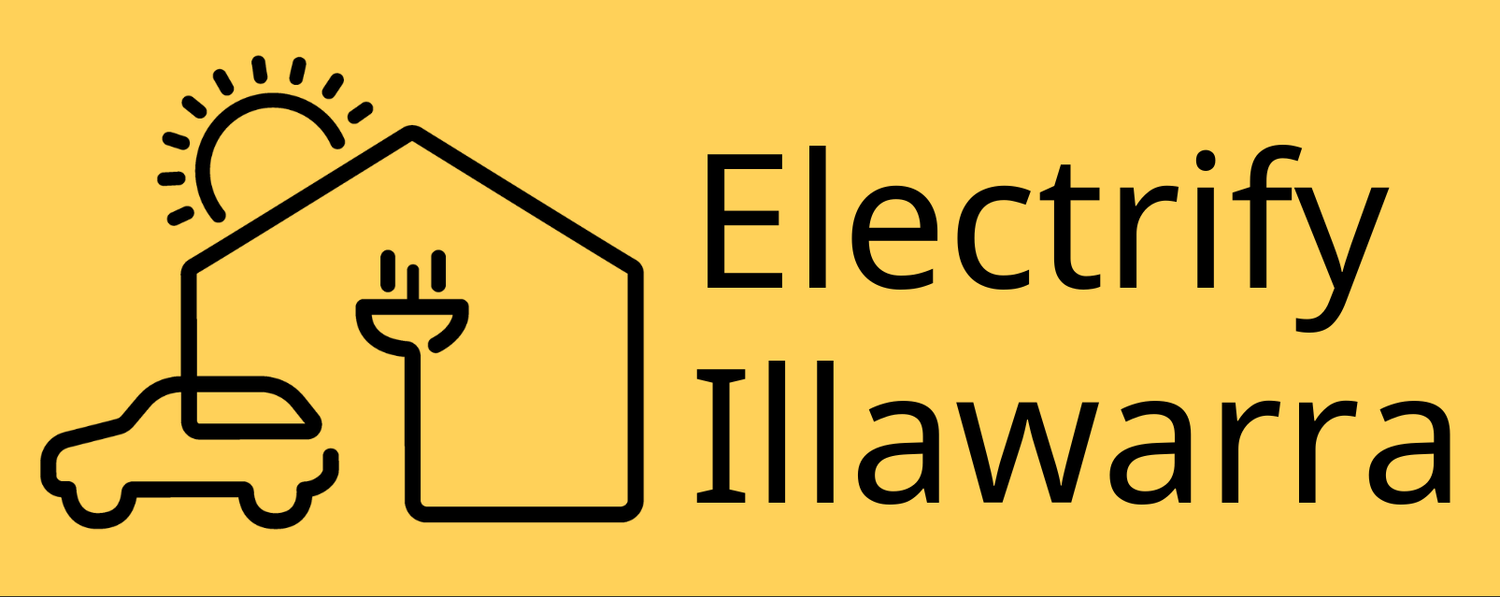How to save energy and reduce your energy bills
Electrify Illawarra continues to share energy-saving tips, help consumers navigate their energy costs, and share information on energy bills relief, government rebates and subsidies to accelerate electrification.
After you make your energy plan, it’s helpful to understand what rebates and support may be available.
To the best of our knowledge, this information is current as of December 2025
Financial assistance is available to eligible NSW residents to reduce their energy bills, including rebates for low-income households, families, seniors and people who use life support equipment at home.
The Federal Government’s Energy Bill Relief Fund finished in 2025. Nonetheless, there are a range of Australia-wide incentive programs running, which you can explore here.
The federal Government’s Solar Sharer Offer was announced in November 2025. It is intended that electricity retailers make available an offer where households can use free electricity during a specific period of the day from 1 July 2026 in certain regulated areas, including all of NSW.
Energy Savings Tips
Energy Made Easy is a comparison tool that enables you to see if you are on the best value energy plan for your needs.
The NSW Government’s Cost of Living Hub has many no-cost, low-effort energy savings tips.
You can get a home energy efficiency assessment and rating for free from the Federal Government.
There are independent, consumer-focused organisations who offer insights and test energy-efficient electric products. They include Choice and Solar Quotes.
Current Council and Government
Rebates & Incentives
Rebates and Incentives are often only offered for a period of time or until a funding pool is used up.
They change every 6-12 months with some being discontinued and new ones started.
To the best of our knowledge, the information below is current as at June 2025.
☀︎ Rooftop Solar
-
Solar: Small-Scale Technology Certificates (STC) Scheme
Who is eligible?
Australian residents & businessesWho funds it?
Federal GovernmentDetails:
The cost of rooftop solar installation in eligible households is reduced by about one third through the STC’s certificate scheme.
Installers will likely claim the STC on your behalf lowering the price of the installation.
Can also claim the Feed in Tariff.
Savings:
Roughly $400 per kW STC subsidy eg.
$3,000 off a 6.6kW system,
$4000 off a 10kW system
(Note this is usually already included in all solar quotes & the value of the STCs is being reduced each year) -
Solar for Apartment Residents
Who is eligible?
NSW residential owners corporations managing an eligible building.Who funds it?
NSW GovernmentDetails:
The grant covers 50% up to $150,000 per project to install rooftop solar on apartment complexes
Note: applications close Mar 2026 and the project must be completed by 30 October 2026.
It’'s a complicated process so start NOW!Help: WattBlock website, UTube videos and Whatsapp group.
Savings:
Up to $150,000 per apartment complex
Home Battery & VPP Connection
-
Illawarra Shoalhaven Community Renewables Program
Who is eligible?
Residents in Kiama, Shellharbour, Shoalhaven and Wollongong council areas.Organised By
The Illawarra Shoalhaven Joint Organisation (ISJO), on behalf of Kiama, Shellharbour, Shoalhaven and Wollongong councils.Details:
ShineHub has signed an agreement with our joint councils to co-ordinate a solar-battery bulk buy and Virtual Power Plant (VPP) for local homes.
Over 330 local households have already joined the Illawarra Shoalhaven Community Renewables Program.
Stay up to date and register your interest via the button below. -
Cheaper Home Batteries Program
Who is eligible?
Australian residents & businessesWho funds it?
Federal Government (via Clean Energy Regulator (CER))Details:
Upfront discount of around 30% on the cost of installing a battery, subject to meeting eligibility criteria.
Batteries provide back-up power and shift electricity that is generated from rooftop solar PV systems during the day to supply evening peak electricity demand.
The discount will generally be provided via solar and battery retailers and installers (included in their quote).
Savings:
Initial discount of about 30% for eligible home battery systems installed in 2025, reducing every calendar year while the scheme is in place.
-
Connect to a Virtual Power Plant (VPP)
Who is eligible?
NSW residentsWho funds it?
NSW GovernmentDetails:
Up to $1,500 upfront payment when you connect your home battery to a Virtual Power Plant (VPP).
- between $400 and $550 for a 10 kWh battery
- between $1,000 and 1,500 for a 27 kWh battery.The payment is generally provided by the VPP operator.
Virtual Power Plants are connected groups of solar batteries that allow excess stored power to be shared during times of peak demand. There is no extra physical connection.Participating in a Virtual Power Plant can help you:
- make money selling your battery’s excess stored electricity
- pay your battery off faster
- support the grid during peaks in demand to keep power costs down, the lights on, and decrease NSW’s reliance on fossil fuels.Savings:
One-off payment of up to $1,500 when you sign up to a VPP.
◎ Electric Vehicles
-
Car Fringe Benefits Tax (FBT) For Small Business
Who is eligible?
Australian businesses & employeesWho funds it?
Federal GovernmentDetails:
For employees who can purchase a Battery Electric Vehicle (BEV) through their employer through a novated lease, no Fringe Benefit Tax will be applied for EVs under $85,000.
Novated Lease is where the car payments and costs of running your new EV (such as tyres, servicing, insurance and registration) are bundled together and deducted from your pay before tax by your employer saving you money that you would have paid in tax.
You also don’t have to pay GST, saving another 10% on vehicle costs.
Savings:
Compared with a traditional 5 year novated car lease, you could save up to $20,000 for an EV novated lease.
-
Luxury Car Tax Rate Threshold
Who is eligible?
Australian residentsWho funds it?
Federal GovernmentDetails:
Luxury Car Tax threshold has been increased.
For ‘fuel-efficient vehicles’ (any model with less than 7.0L/100km combined fuel consumption, including EVs), LCT will apply on models priced beyond $89,332.
Savings:
Buyers of certain standard vehicles which are priced above the old and new LCT thresholds will pay up to $1520 less in tax, while buyers of fuel-efficient vehicles could save up to $1324.
〰 Hot Water, Airconditioning, Cooking & Lighting
-
Energy Savings Scheme
Who is eligible?
NSW residentsWho funds it?
NSW GovernmentDetails:
Via the Energy Saving Scheme eligible households to replace their old water heaters with more energy-efficient models.
Choice of approved models and installers.
You need to pay a minimum $30 but may get up to $2000 off the price of a heat pump hot water system.
To be processed by the installer (not all installers are registered with the ESS scheme so check first)
Savings:
You can receive around $600/STC subsidy from federal government which is combined with an additional $500 NSW government subsidy when replacing gas hot water system, or $1000 extra NSW gov subsidy when replacing electric hot water system.
-
Energy Savings Scheme
Who is eligible?
NSW businessesWho funds it?
NSW GovernmentDetails:
Subsidised replacement and upgrades to lighting, heating, aircon, ventilation, motors, fans, pumps, compressed air systems, refrigeration, power systems, hot water, steam systems and furnaces.
Incentive payments vary with a minimum $250 co-payment requirement.
Savings:
You can receive around $600/STC subsidy from federal government which is combined with an additional $500 NSW government subsidy when replacing gas hot water system, or $1000 extra NSW gov subsidy when replacing electric hot water system.
-
No Interest Loan Scheme
Who is eligible?
Australian low income residentsWho funds it?
Federal Government (administered by Good Shepherd)Details:
Good Shepherd is a government-funded charity supporting women and families. The No Interest Loans Scheme (NILS) offers individuals and families on low incomes access to safe, fair and affordable loans for purchasing appliances and some other essential household expenses.
The NILS scheme offers loans of up to $1500 for essential goods and services for people that have a health care card/pension card or earn less than $45,000 a year after tax, $60,000 after tax for joint applicants or people with children

